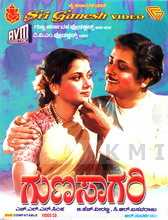“Gunasagari” is a revered Kannada film released in 1953, directed by the legendary H. L. N. Simha. This cinematic piece is adapted from a play written by G. P. Rajarathnam, which was inspired by William Shakespeare’s “King Lear.” The movie features a stellar cast, including Rajkumar, Pandari Bai, Narasimharaju, G.V. Iyer, and B. Raghavendra Rao.
The film’s narrative revolves around the central character, Gunasagari, portrayed by Pandari Bai. Gunasagari is the youngest and most virtuous daughter of the wealthy and noble elder, Satyashraya, played by G. V. Iyer. The story unfolds with Satyashraya deciding to divide his wealth among his three daughters based on their expressions of love and loyalty towards him.
The elder daughters, Sumana and Keerthi, deceitfully profess their profound love for their father to gain his favor and a larger share of his wealth. In contrast, Gunasagari, the epitome of honesty and virtue, refuses to flatter her father with empty words. She believes in actions over words and maintains her integrity, resulting in her being unfairly deprived of her rightful share of the inheritance.
As the plot progresses, Satyashraya, deceived by the false flattery of his elder daughters, eventually faces their true nature. They neglect and mistreat him, revealing their greed and lack of genuine affection. Meanwhile, Gunasagari, despite her father’s earlier unjust treatment, remains devoted and caring. Her unwavering loyalty and selflessness stand in stark contrast to her sisters’ betrayal.
The film delves into themes of familial love, loyalty, and the consequences of blind trust and deception. The moral fabric of the story is woven around the virtues of truth, integrity, and selflessness, encapsulating the cultural ethos of the time.
Rajkumar, who plays a significant role in the movie, delivers a powerful performance that enhances the film’s emotional and dramatic depth. His character adds another layer of complexity to the narrative, contributing to the film’s exploration of human values and relationships.
Narasimharaju provides the much-needed comic relief, balancing the film’s serious undertones with his impeccable timing and humor. His role, though lighter, is integral to the overall storytelling.
The music in “Gunasagari,” composed by B. R. Lakshman Rao, complements the film’s narrative beautifully, with songs that resonate with the emotional core of the story. The film’s setting, reflective of traditional Kannada culture, adds authenticity and depth to the storytelling.
Overall, “Gunasagari” is a timeless classic that continues to be remembered for its poignant storytelling, strong performances, and moral lessons. The film not only entertained audiences but also offered a reflective look at human nature and the virtues of honesty and loyalty.


